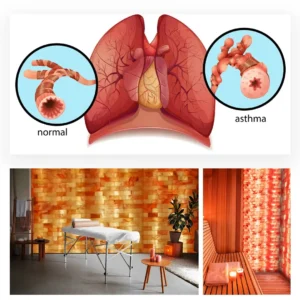Millions of people worldwide suffer from allergies, varying from slight fits of sneezing to severe, life-threatening disorders. Alternative therapies such as salt therapy have recently gained vogue as they are believed to help control allergies. This article discusses the significance of salt therapy for allergies, examines the causes and symptoms of allergy infections, and evaluates available scientific evidence backing its use.
Allergies: Causes and Symptoms
Allergies ensue when the immune system responds too much against ordinarily innocuous substances comprehended as allergens. Some common allergens include pollen grains, dust pittances, pet fur or feathers (dander), mold spores, and specific foods like nuts or shellfish. Once an allergic person comes into contact with their catalyst material, their immune system mistake it for dangerous invaders, thereby removing histamines, among other chemicals, into the bloodstream to fight them off; this overreaction by our defense agencies leads to other symptoms being shared by us during an attack.
Causes of Allergies
Genetic Factors:
It has been uncovered that individuals inherit tendencies to develop specific forms of hypersensitivity reactions from their parents. If either one or both parents suffer from allergies, then there is a high likelihood that their children will also acquire them at some moment in life.
Environmental Factors:
Changes in surroundings, such as vulnerability levels to allergenic substances, e.g., pollens/molds due to climate changes, pollution, etc., may contribute greatly to starting these hypersensitive reactions among sensitive people living within such circumstances.
Immune System Response:
Abnormal reactions ensue when immunity identifies harmless antigens as threats. This leads to the exhibit of large amounts of inflammatory mediators like leukotriene’s, which amplify allergic hives throughout body tissues, including skin, mucous membranes, and the respiratory tract.
Symptoms of Allergies
Expressions vary depending on the person and type of allergen accountable for starting them. Some common signs include:
Respiratory Symptoms:
These may vary from sneezing fits accompanied by runny/stuffy noses and eyes watering due to itching within nasal passages caused by dust mite feces to persistent coughs irritating the airways and bronchospasm started when pollen grains come into connection with the lining of the bronchi, among others.
Skin Reactions:
Others experience skin problems like hives, eczema, or itchy rashes, which are usually seen following the ingestion of certain foods (e.g., nuts) or after being stung by bees or wasps.
Digestive Issues:
Some people might encounter gut-related symptoms such as vomiting, diarrhea, etc., especially if they are allergic to particular proteins found in fish eggs, albumin, etc.
Severe Reactions:
Though rare, very severe cases can occur where anaphylaxis sets in, causing difficulty subsisting and swelling around the throat. This can lead to a collapse of blood pressure levels, thereby posing great threat to the life of the fake individual unless prompt medical attention is sought immediately.
Salt Therapy: A Summary
Salt therapy, or halo therapy, is a therapy that affects living in salt micro particles for additional appropriate respiratory health and public well-being. In the past, these were natural salt caves found in Eastern Europe where people would go to get relief from all sorts of lung problems hundreds of years back because just staying inside these mineral-rich underground caverns could greatly ease chest congestion, thus allowing easier breathing as well as promoting overall body health. Nowadays, salt rooms that imitate this environment are constructed artificially so that customers can naturally enjoy similar benefits gained by being directly exposed to such surroundings.
How Salt Therapy Works?
Most of its action occurs when particles are inhaled deep down the airways within the lungs, where they can easily reach. These particles have several believed effects:
Anti-inflammatory Properties:
This refers to reducing irritations inside the bronchi caused by allergic asthma attacks or any other inflammatory respiratory disease affecting the airways.
Antimicrobial Effects:
Salt therapy, a natural disinfectant, might help clear bacteria and other microorganisms from the lungs during an infection.
Mucus Clearance:
Another effect is that when breathed in, it helps to loosen up mucus plugs, enhancing breath and getting rid of cough congestion, etcetera.
Can salt therapy be effective against allergies?
Research and Evidence
The effectiveness of salt therapy in treating allergies continues to be investigated. Numerous studies have been carried out to determine potential benefits, but their outcomes vary considerably. Some studies showed that salt therapy could relieve some types of allergic conditions; however, other investigations reported no statistically significant difference between treated groups and control groups at all.
Respiratory Allergies:
According to some research findings, this form of treatment may help alleviate symptoms associated with respiratory allergies such as bronchial asthma or allergic rhinitis, which causes inflammation of lining cells covering the nasal cavity, making one experience a stuffy nose, among others (International Journal of Environmental Research). For instance, Panyukov et al. (2019) conducted an experiment where particfipants with asthma went through multiple sessions of this treatment, and their lung functions improved significantly while symptoms decreased considerably too.
Skin Allergies:
Salt therapy can also benefit patients suffering from skin diseases due to hypersensitivity reactions, as in the case of eczema, which presents with dry, itchy patches on different parts, including the face, hands, etcetera (Journal of Dermatological Treatment). However, Kim et al. (2018) found out during their study that not every type showed a positive response towards it, but there was improvement observed when applied, especially together with additional measures like moisturizing creams, although more research is still needed before making conclusions.
Overall Effectiveness:
Reports indicate possible advantages, yet another group fails to identify any significant difference between treatment and placebo arms among patients treated for various allergic diseases affecting the respiratory system caused by allergens (Allergy). In other words, Kuzmich et al. (2020) performed a systematic review where they stated that there might be some truth behind claims made about benefits associated with using salts against allergies, but further high-quality investigations need to be done in order to ascertain whether indeed this is a cure for allergy.
Patient experiences
Typically, salt therapy brings about subjective improvements in patients’ allergic states. More often than not, a person starts feeling better as soon as they receive this treatment. However, it must be remembered that these facts are not backed up by scientific research alone since different individuals with similar conditions can react differently.
How do I fit salt therapy into my allergy management?
For those who would prefer to manage their allergic reactions using salt therapy as an alternative method, here are some ideas:
Consultation:
Before starting your sessions, ensure you speak to a healthcare provider, especially if you are taking other drugs or have underlying health issues.
Reputation:
Where possible, only go to well-known facilities staffed by professionals. Most places offer one free visit, so make use of it and ask all necessary questions about what will happen in subsequent visits until you are satisfied.
Supplement:
Salt therapies should never replace conventional medicine; instead, they should be used together with prescribed drugs as this increases the chances of complete recovery from the illness.
Conclusion
Generally speaking, salt therapy appears to be a viable treatment option for allergies, although its effectiveness varies widely among individuals. The possible advantages of such treatments, including anti-inflammatory properties and bactericidal effect, suggest that they may assist people with respiratory or skin allergic conditions (International Journal of Environmental Research). Nevertheless, until more data is collected through properly conducted trials involving large numbers, we cannot say whether salts work on such diseases (Allergy). It is also worth noting that while these findings seem promising, they still require validation by many more high-quality research works before being considered sufficiently reliable to support their application in medical practice.






